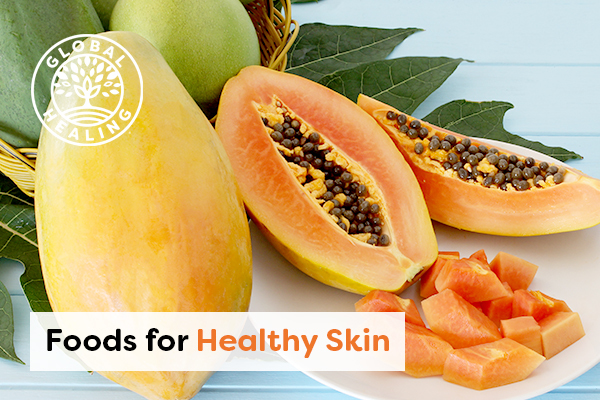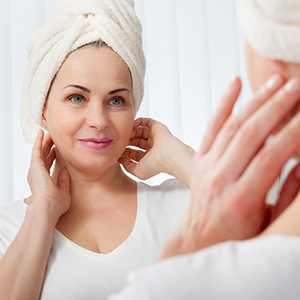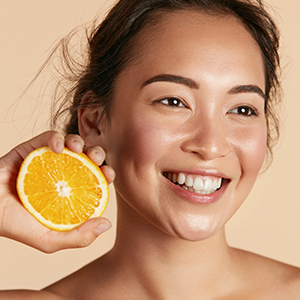
What if the secret to clear, healthy, radiant skin isn’t found in a cream or serum, but rather in the food you eat? In fact, that is true! Whole foods contain nutrients that can get you glowing — naturally. Fruits and vegetables that are high in vitamins A, C, and E, antioxidant-rich dark chocolate, as well as nuts and seeds that contain omega-3 fatty acids… these are some of the best foods for healthy skin.
Whether you’re dealing with adult acne, dry skin, aging, or anything in between, tweaking your diet may be the skin care solution you’ve been seeking. No matter what kind of shape your skin is in, you can improve your complexion with nutritious food.
Why Is Nutrition Important for Glowing Skin?
While you may think the condition of your skin is determined by age, genetics, and other factors beyond your control, that’s only partially true. A number of external, lifestyle-related things affect skin health — including the foods you eat, as well as sun exposure, smoking, and sleep deprivation. These can all "speed up" the aging process, influencing the way skin looks.[1] Ready to turn that around?
You can take steps to stop damage before it starts — or after it has begun. And one of the simplest steps is to eat nutrient-rich foods that promote healthy, glowing skin. Beauty truly does come from within!
Key Nutrients for Healthy Skin
There are hundreds or even thousands of positive food choices you can make. In addition to the items we list below, look for whole foods containing the following powerful and potent nutrients plus these vitamins for glowing, healthy skin. Where your diet falls short, fill the gaps with organic supplements.
Coenzyme Q10 (CoQ10)
CoQ10 plays an important role in converting the food you eat into energy. It’s also a powerful antioxidant that can benefit aging skin by protecting skin cells from oxidative damage.[2] Internal use of CoQ10 along with BioPQQ (pyrroloquinoline quinone) may reduce fine lines and visibly improve skin texture.[2]
Vitamin C
Also known as L-ascorbic acid, vitamin C protects skin from sun damage and stimulates collagen production.[3] You can also apply vitamin C topically to promote a bright, even complexion and skin elasticity.[3] Plant-based forms of vitamin C are ideal, such as Global Healing's Organic Vitamin C liquid extract.
Polyphenols
Polyphenols are a group of chemicals with powerful antioxidant properties that protect skin cells from damage caused by ultraviolet (UV) rays, pathogens, and more.[1] Sixty percent of polyphenols are flavonoids (a category that includes anthocyanins, quercetin, and catechins). Other non-flavonoid polyphenols include curcumin, phenolic acids, and stilbenes, like resveratrol and pterostilbene.
Carotenoids
These derivatives of vitamin A — including beta-carotene, retinol, astaxanthin, and lycopene — are potent antioxidants. They protect your skin from the sun and have anti-aging properties.[1]
Tocopherols (Vitamin E)
When people talk about vitamin E, it’s actually a group of eight antioxidant compounds called tocopherols. Vitamin E can support healthy aging of the skin, especially when used with vitamin C.[1]
Vitamin D
Your skin synthesizes vitamin D through sun exposure.[4] Since many of us don’t get enough sun to produce sufficient vitamin D, eating D-rich foods or a vitamin D supplement is beneficial for skin (and overall) health. Vitamin D3 plays a vital role in the formation of the skin’s protective barrier and may help prevent UV damage.[4]
Best Foods for a Clear & Radiant Complexion
Now that you know which nutrients are most beneficial for skin health, your next move is to fill your plate with the things that contain them. What are the best foods for your skin? Below, we list several foods with significant amounts of skin-supporting nutrients.
Avocados
Avocados are rich in "good" monounsaturated fatty acids that promote healthy aging.[5] They also contain vitamin C and tocopherols (vitamin E), which work synergistically to support skin health.[1] Avocados also provide a good source of B vitamins that promote strong, healthy hair and skin.
Olives & Olive Oil
The antioxidant polyphenols in this nourishing oil may prevent oxidative damage to skin, reduce inflammation, and promote healing.[6] Look for a high-quality, organic extra virgin olive oil that has been cold-pressed to preserve nutrients. Ozonated olive oil also has benefits for skin health when used topically.
Dark Chocolate
This sweet treat contains polyphenols like resveratrol, linked to skin-supporting benefits like reducing wrinkles and age spots.[7] Resveratrol is a potent antioxidant, so eating dark chocolate (70 percent or higher) can help protect your skin from damaging free radicals.
Green Tea
Consider subbing your daily cup of joe for a mug of green tea. It contains an abundance of plant polyphenols, including EGCG, that can protect skin from free radical damage. Green tea can be especially helpful for preventing premature aging caused by UV exposure.[8]
Sweet Potatoes
Sweet potatoes contain the carotenoid beta-carotene, which gives them their vivid orange hue.[1] And the less common — but no less nutritious — purple sweet potato is a good source of anthocyanins, another potent antioxidant with anti-aging properties.[9]
Mangoes & Papayas
Just like sweet potatoes, these orange-fleshed fruits are rich in beta-carotene.[1] Mangoes also contain vitamins C and E and are full in polyphenols like quercetin (try our vitamin C smoothie recipe with mango!).[10] These two fruits are among the best foods for clear skin.
Red Grapes
The skin of red grapes contains an abundance of resveratrol, the same anti-aging antioxidant found in dark chocolate.[7] For a fun summer treat, store some red grapes in the freezer and pop a few when you’re craving something sweet.
Walnuts
Walnuts are an excellent source of omega-3 essential fatty acids (EFAs), which help to keep skin soft and supple.[1] Chia seeds, pumpkin seeds, sunflower seeds, and flax seeds are also good plant-based choices for getting moisturizing EFAs into your diet.[1]
Fermented & Probiotic Foods
A healthy gut is crucial for overall wellness, and fermented and probiotic foods provide your digestive system with the "good" bacteria it uses to stay balanced. When your gut is happy, it shows in your skin! Sauerkraut, kimchee, and miso are examples of fermented foods that can provide probiotic benefits.[11]
Prebiotic Foods
A prebiotic is something that provides fuel for the beneficial organisms in your gut. Prebiotic foods contain a type of fiber that feeds the good bacteria in your digestive tract, helping it to thrive.[12] Prebiotics occur naturally in foods like artichokes, garlic, onions, beans, and beets.[12]
Berries
Whether eaten by the handful or blended into a smoothie, berries pack a big skin-supporting punch. Blueberries, strawberries, and other brightly-colored berries contain high amounts of bioactive antioxidant compounds like flavonoids and anthocyanins that protect the skin from oxidative damage.[13]
Purified Water
While not a food per se, getting enough of the right kind of water is one of the most important ways to ensure you have healthy skin. Every cell in your body requires water to function, so it’s no surprise that hydration has a huge impact on skin health. Water helps form a protective barrier over the skin, and keeps it looking plump and dewy.[14]
Fasting for Skin Health
While it’s obviously not a food, fasting — or going without eating for short periods — can provide a number of anti-aging benefits to the skin (and the rest of your body). Restricting calories in a safe and reasonable way, as with fasting, may even delay the aging process as it resets your cells.[1]
An easy way to make fasting a part of your life is to occasionally skip breakfast, meaning you fast from after dinner the night before until lunch the next day. Another option is the 5:2 diet, where you eat normally for five days and then fast for two.
Points to Remember
Certain foods — and the nutrients they contain — can help take your skin condition from "meh" to marvelous, revealing the natural beauty within. Some of the best nutrients for healthy skin include CoQ10, vitamin C, polyphenols, carotenoids, vitamin E, and vitamin D.
You can get those skin-boosting nutrients and more from a variety of fruits, vegetables, seeds, and healthy oils. The good fats in avocados and walnuts to the vitamins and antioxidants in colorful fruits and vegetables, nutrients in food can vastly improve the health of your skin. And don’t forget to drink plenty of water and take occasional fasting breaks for a glowing, youthful complexion. This may just be the natural skin care solution you've been looking for!
References (14)
- Schagen SK, et al. Discovering the link between nutrition and skin aging. Dermatoendocrinol. 2012;4(3):298-307.
- Žmitek K, et al. The effect of dietary intake of coenzyme Q10 on skin parameters and condition: Results of a randomised, placebo-controlled, double-blind study. Biofactors. 2017 Jan 2;43(1):132-140.
- Pullar JM, et al. The roles of vitamin C in skin health. Nutrients. 2017;9(8):866.
- Mostafa WZ, Hegazy RA. Vitamin D and the skin: Focus on a complex relationship: A review. J Adv Res. 2015;6(6):793-804.
- Dreher ML, Davenport AJ. Hass avocado composition and potential health effects. Crit Rev Food Sci Nutr. 2013;53(7):738-750.
- Lin TK, et al. Anti-inflammatory and skin barrier repair effects of topical application of some plant oils. Int J Mol Sci. 2017;19(1):70.
- Buonocore D, et al. Resveratrol-procyanidin blend: nutraceutical and antiaging efficacy evaluated in a placebo-controlled, double-blind study. Clin Cosmet Investig Dermatol. 2012;5:159-165.
- OyetakinWhite P, et al. Protective mechanisms of green tea polyphenols in skin. Oxid Med Cell Longev. 2012;2012:560682.
- Li A, et al. Research advances of purple sweet potato anthocyanins: Extraction, identification, stability, bioactivity, application, and biotransformation. Molecules. 2019;24(21):3816.
- Lauricella M, et al. Multifaceted health benefits of mangifera indica L. (mango): The inestimable value of orchards recently planted in sicilian rural areas. Nutrients. 2017;9(5):525.
- Rezac S, et al. Fermented foods as a dietary source of live organisms. Front Microbiol. 2018;9:1785.
- Davani-Davari D, et al. Prebiotics: definition, types, sources, mechanisms, and clinical applications. Foods. 2019;8(3):92.
- Skrovankova S, et al. Bioactive compounds and antioxidant activity in different types of berries. Int J Mol Sci. 2015;16(10):24673-24706.
- Palma L, et al. Dietary water affects human skin hydration and biomechanics. Clin Cosmet Investig Dermatol. 2015;8:413-421.
†Results may vary. Information and statements made are for education purposes and are not intended to replace the advice of your doctor. If you have a severe medical condition or health concern, see your physician.







